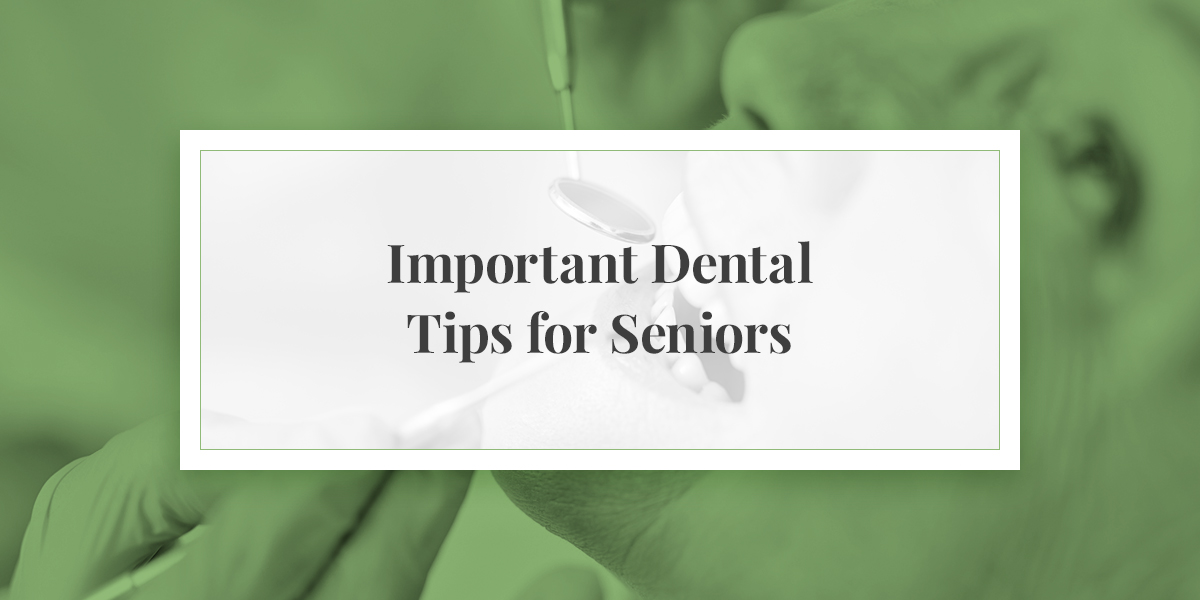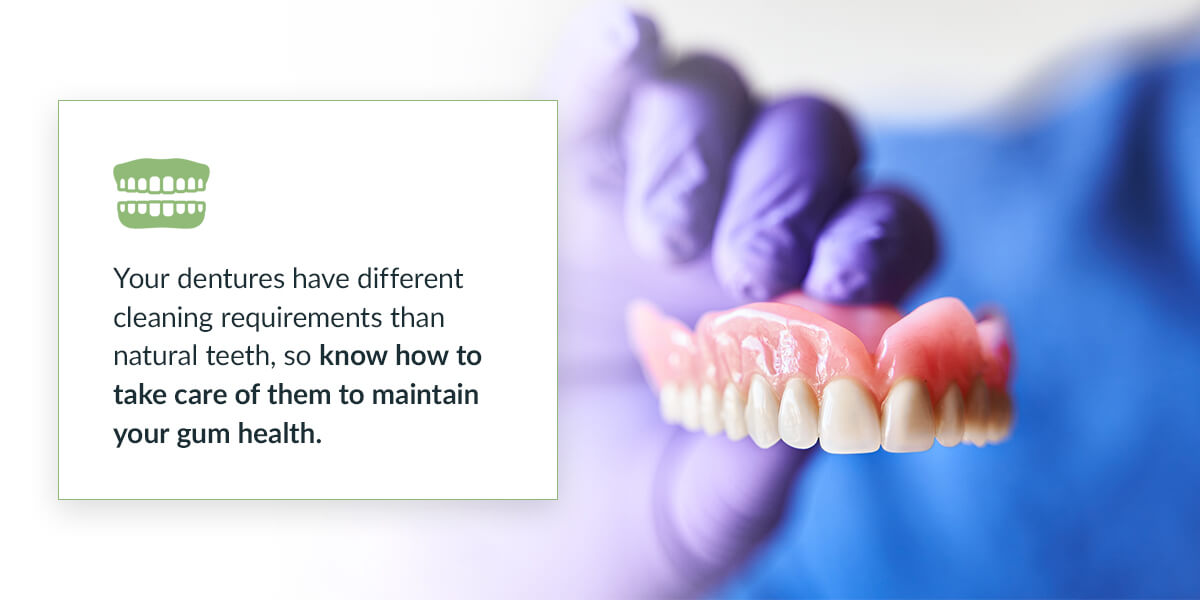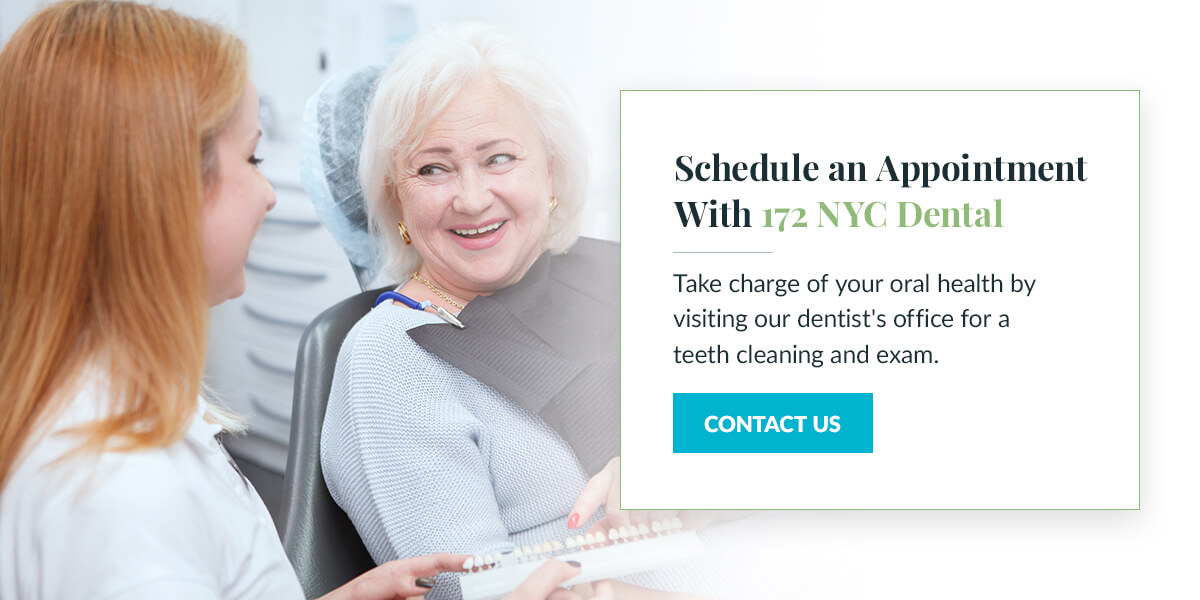
When you’re older, you have the same needs as your younger self, but you also have to be more careful about staying healthy. If you’re looking for oral health tips for seniors, this guide provides information to help — without serving as a replacement for personal medical advice. Keep reading for facts on senior dental care that you can apply to your daily routine.
The Importance of Dental Care for Seniors
Taking care of your dental hygiene has many benefits for older adults, including preventing:
- Tooth decay: If you’re taking certain medications that cause dry mouth, the lack of saliva makes you more susceptible to cavities. You can prevent plaque buildup and cavities by brushing regularly.
- Gum disease: According to the Centers for Disease Control and Prevention (CDC), around 2 in 3 adults older than 65 have gum disease. The symptoms are typically mild until the disease advances. Taking care of your teeth and gums and getting dental exams regularly can help prevent gum disease.
- Tooth loss: You can experience tooth loss as you age, which can lead to other issues, like a lack of adequate nutrition.
- Heart disease, heart attack, and stroke: Gum disease can lead to inflammation and increase your risk of cardiovascular problems.
Common Senior Dental Problems
As an older adult, you may be more susceptible to darkened or yellow teeth, periodontal disease, tooth decay, and tooth loss. These conditions become more common as you age because you gradually lose enamel, the protective outer layer on your teeth. Untreated dental problems are correlated with the below conditions:
- Pneumonia: Poor dental hygiene increases your risk of developing pneumonia, especially if you smoke. Bacteria from between your teeth can travel into your lungs.
- Diabetes: If you have diabetes, you are at an increased risk for developing dental problems because elevated levels of glucose in your saliva promote bacterial growth. Gum disease has also been shown to worsen blood sugar control in diabetic patients.
- Oral cancer: As an older adult, you are at an increased risk of developing oral cancer, especially if you use tobacco and nicotine products.
Senior Dental Care Tips
Below are essential dental tips for the elderly to help keep your mouth healthy:
1. Brush and Floss Daily
You should brush and floss your teeth at least twice daily. Some dentists recommend brushing between meals, but brushing twice each day is ideal. If you’re trying to improve your oral hygiene routine, brushing more can help.
When you brush your teeth, try to brush consistently for two full minutes. Be sure to floss, as well. You can improve your dental health outcomes if you use dental floss, which gets between your teeth into tight spaces that your toothbrush is unable to reach.
2. Upgrade Your Toothbrush
You can also start using an electric toothbrush if you need help with the mobility aspect of brushing or if you want to improve your technique. Make sure you also change your toothbrush or the head every three months to prevent the overgrowth of bacteria.
The bristle strength of your brush should be firm enough to do the job without hurting your gums. Many dentists recommend soft toothbrushes, especially for older adults, but if you have a gum condition, your dentist may recommend a hard-bristle brush. Remember to use gentle pressure when brushing.
3. Increase Fluoridation
Use a toothpaste that contains fluoride. Some brands will say they are dentist recommended, but you can also ask your dentist for suggestions. Fluoride helps fight tooth decay and cavities.
4. Rinse With Mouthwash
You can enhance your brushing routine with an antiseptic mouthwash. Avoid using mouthwash as a replacement for regular brushing and flossing. Gargling mouthwash as a final step in your routine can help control the population of bacteria in your mouth, but the only way to clear out food particles that bacteria feed on is by using a toothbrush and floss.
If you dislike using mouthwash because it feels aggressive or uncomfortable, try an alcohol-free mouthwash. Use mouthwash as directed on the package.
5. Take Calcium Supplements
If you’re like many older adults, you lack enough calcium in your diet. You may need to increase your calcium intake to make sure you’re getting enough of this valuable mineral. Calcium can help keep your teeth strong and reduce the symptoms of osteoporosis. Discuss this option with your healthcare provider to see if calcium supplements could help your oral health.
6. Avoid Tobacco Products
Tobacco products like cigarettes, cigars, and chew can reduce your oral health and impact your overall health. Tobacco stains your teeth, causes tooth decay, and raises your risk of throat and mouth cancer. Other health problems associated with tobacco use include heart disease and stroke. Quitting tobacco can give you better health outcomes.
7. Control Sugar Intake
Foods and drinks high in sugar can cause tooth decay, cavities, and gum disease. Sugar feeds the problematic bacteria in your mouth, so try to avoid sugary beverages, snacks, and desserts. Instead, eat foods that are good for your dental health, like fruits and vegetables.

8. Maintain Proper Denture Care
You can get gum disease even if you wear dentures. Your dentures have different cleaning requirements than natural teeth, so know how to take care of them to maintain your gum health. Generally, you can follow these denture care tips:
- Take your dentures out and rinse them after eating.
- Clean your mouth after taking out your dentures.
- Brush your dentures with a soft brush at least once a day.
- Soak your dentures in a recommended denture solution overnight.
- Avoid cleaning your dentures with whitening toothpaste and abrasive materials.
Your dentist can suggest other care tips for your specific set of dentures.
9. Watch out for Any Dental Side Effects of Medication
Some medications can cause dry mouth or make you more susceptible to tooth decay. Make sure you talk with your doctor about the potential side effects of your medication.
10. Stay Hydrated
Staying hydrated helps counteract dry mouth and prevents the erosion of your enamel. Increasing your water intake can help alleviate dry mouth. Drinking water is vital to all aspects of your health, but how much water your body requires each day depends on your body weight, activity level, and other factors. Drink at least six to eight glasses of water daily, unless your doctor recommends otherwise. It helps to keep a water bottle with you.
11. Visit the Dentist
Following all of the above dental tips for seniors can help you maintain good oral health, but you still need to schedule regular appointments to see your dentist. Rarely visiting the dentist leads to delayed treatments and worsening health. Schedule appointments with your dentist for teeth cleanings at least twice annually.
Need a dentist fast? Our team offers same-day appointments 7 days a week.
Maintaining a regular appointment schedule with a trusted dental office is one of the most important steps you can take to protect your oral health. Your dentist is there to talk to you about the type of care you require and answer any questions or concerns you might have. Your dentist will also check your teeth for developing oral conditions, including cancer. Getting an early diagnosis can make a big difference in your treatment plan.
Schedule an Appointment With 172 NYC Dental
Are you due for an appointment? Take charge of your oral health by visiting our dentist’s office for a teeth cleaning and exam. Learn more about our diagnostic and preventive services, or contact us to make an appointment today.









